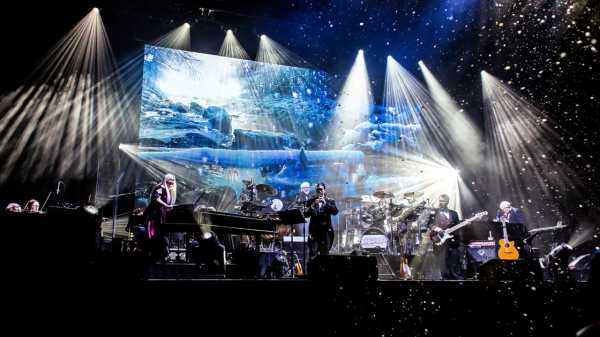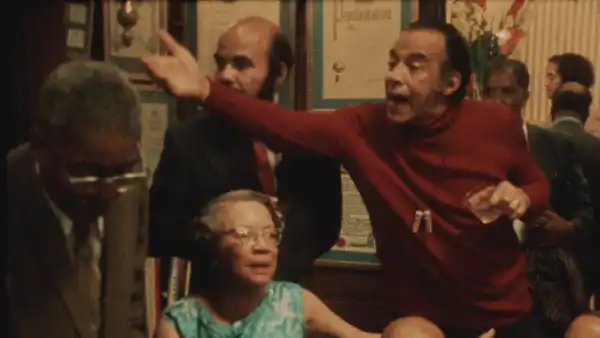
The story of Christmas Day, as recounted in the Gospels of Matthew and Luke, is fairly radical: a virgin mother gives birth to a son in a remote and frigid barn, while an angel descends to a group of shepherds and declares the baby the Saviour of all of mankind, fulfilling eons of messianic prophecies. Given the holiday’s origins, one could argue that most traditional Christmas music is too demure and reverential—a polite refrain of “pa-rum-pum-pum-pum” can’t really convey the wildness of a divine miracle. The enduring exception to this, of course, is the heavy, enveloping wave of the neoclassical act Mannheim Steamroller, a sound so plainly nuts and uncanny that it suggests anything is possible.
Per a 2016 Billboard accounting, “Christmas,” Mannheim Steamroller’s first collection of boosted holiday classics, remains the third best-selling Christmas album of all time, just behind Elvis Presley and Kenny G. Now I say unto you: if your response to the throbbing opening synthesizer notes of “Deck the Halls”—rejiggered, Steamroller-style, for maximum histrionics—is not “Hell yes!,” then you have not enjoyed enough eggnog with your supper.
In the last twenty-five years, Mannheim Steamroller has sold more than twenty-seven million Christmas albums, between “Christmas” (six million copies) and its many follow-ups. (Pause on that number for a moment—Beyonce’s “Lemonade” sold around two and a half million copies.) The project is the brainchild of Chip Davis, who arranged, conducted, and produced “Christmas.” He is also credited with playing several instruments, including the recorder, the crumhorn, and “dry ice.”
In 1974, Davis, a classically trained bassoonist and composer, was living in Omaha, Nebraska, and writing jingles for Bozell & Jacobs, a local advertising agency. He and William Fries, the agency’s creative director, conjured up a truck driver and C.B.-radio virtuoso named C. W. McCall for a series of commercials for the Old Home Bread Company. (“Old Home is good buns,” the tagline went.) The McCall character—a smooth-talking long-haul trucker, part Chuck Yeager, part Waylon Jennings—was so instantly and thoroughly beloved that Davis and Fries were offered a record deal. Fries voiced the character; Davis wrote the music. McCall’s first single, “Convoy,” made it to No. 1 on both the country and pop charts. It also inspired a feature film, directed by Sam Peckinpah and starring Kris Kristofferson, Ali MacGraw, and Ernest Borgnine; “Convoy” went on to become the highest-grossing film of Peckinpah’s career.
With the cash he’d earned from “Convoy,” Davis decided to start his own band. He took to describing Mannheim Steamroller as “eighteenth-century classical rock.” The outfit was named after the Mannheim roller, an intense melodic crescendo developed by the court orchestra of the German city of Mannheim, in the mid-seventeen-hundreds. How to characterize the Steamroller aesthetic? The vibe is extreme. Davis’s arrangements include elements of progressive rock—his work is dramatic, maximal, ambitious—and of New Age music, which, in the mid-seventies, was just beginning to find its center as a genre. His pieces are largely instrumental, and each part is performed with precision and vigor. There is something dorky but hugely glorious about the entire enterprise. For me, it slots neatly alongside such prized cultural artifacts as “Game of Thrones” and Dungeons & Dragons: at first, it requires some intellectual acrobatics to enjoy, but its pleasures are deep, weird, and pure.
Davis was confident in Mannheim Steamroller’s market value, but the record companies he pitched on the project felt differently. Undeterred by the crisp “No, thanks!” he received from every label he approached, Davis started his own company, American Gramophone, and figured that he could distribute the work himself. This, too, proved challenging; record stores weren’t particularly interested in carrying “Fresh Aire,” Steamroller’s début LP. I can see where they were coming from. It is deeply odd to consider the symphonic pop of “Fresh Aire” in the rollicking context of 1975, a year when Glen Campbell’s “Rhinestone Cowboy,” the Bee Gee’s “Jive Talkin’,” David Bowie’s “Fame,” and Earth, Wind & Fire’s “Shining Star” were all colossal radio hits. Mannheim Steamroller doesn’t swing, exactly—there is no rhythmic pocket. It does not suggest romantic times. If K.C. and the Sunshine Band’s “That’s the Way (I Like It)” is intended to cause a person to slip into a low-cut silk jumpsuit and shimmy about in a deep and reckless manner, Mannheim Steamroller’s “Mist” simply asks that you tuck in your shirt and, perhaps, sit a bit straighter in your chair.
Yet this is the stretch in the Steamroller odyssey where it is tempting to think, This Chip Davis fellow—was he in fact a great visionary of the twentieth century? Since record stores wouldn’t willingly carry his album, Davis figured out that he could ship “Fresh Aire” to stores peddling high-end stereo equipment and convince them to play it on the display models. Given his music’s gusto and exactitude, it made sense that his records would effectively show off a stereo’s tone, clarity, and range. The move harkens back, in an unexpected way, to the earliest days of the commercial recording industry, in which furniture stores sold 78-r.p.m. records alongside wooden phonograph cabinets—customers took home a turntable, and also something they could play on it.
The maneuver worked. “Fresh Aire” was eventually certified gold. In 1984, Davis alighted on another deeply unfashionable idea: extravagant reworkings of Christmas music, performed with vehemence and untold intensity. Nowadays, it’s not uncommon for a commercially viable artist, still in the midst of an active career, to release a holiday album. John Legend, Eric Clapton, and Jessie J. have Christmas releases planned for 2018; last year, Gwen Stefani, Sia, and Blake Shelton all issued holiday collections. In the nineteen-eighties, though, it was often seen as a white flag of surrender.
But for Davis, who is now seventy-one, a Christmas album led to untold riches and several decades of touring. At present, there are two different iterations of Mannheim Steamroller crisscrossing the country to meet audience demands. “It’s more of an experience than a concert or a show,” Davis has said, of “Christmas Live.” The production involves extensive video, lights, special effects, costumed ushers, dioramas, and at least a dozen blooming poinsettias.
How do we begin to isolate and explicate the strange pleasures of Mannheim Steamroller’s “Christmas”? Davis’s music has not always appealed to critics. On occasion, it can seem like music for people who do not like music. (Another of Davis’s marketing strategies was to have his albums sold in grocery-checkout lines and at hardware stores.) “I’ve read some of the headlines, things like ‘Commercial Musical Stew,’ ” he told the Times, in 2005. “All I know is that 15,000 people came to my concert, and I saw them stand up. And they weren’t standing up to leave.”
“Christmas” can instantly transform a holiday that might be feeling fraught and melancholic into something theatrical and borderline absurd. I am grateful for its audacity and the way it makes me desperately want to karate-chop a glazed ham. These songs are big and extreme enough to feel apropos, somehow, to both the religious origins of Christmas Day and to the way we celebrate it now: a preposterous, overtly commercial bacchanal that is nonetheless seeped in joy.
Sourse: newyorker.com






